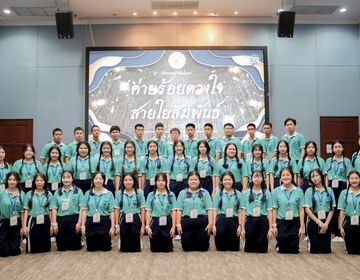Tapas to Pad Thai: My Experiences Teaching Abroad in Spain and Thailand with CIEE
CIEE Teach Abroad & TEFL Alum Spotlight: Meet Meghan!
I have totally become the annoying friend that won’t stop talking about their time abroad. In my defense, it was one of the best decisions I’ve ever made—and I want everyone to have the chance to experience it. My two (ish) years of teaching in Spain and Thailand have shown me what this world has to offer, and it's a great pleasure to share a little piece of that with you.
In all honesty, I went to Spain on a whim. I graduated college with a degree in Physiology and knew I wasn’t going to medical school. A friend of a friend mentioned CIEE, and before I knew it, my application was accepted and I was on a flight to Madrid. Thailand, however, was a different story. I came back from Spain in July of 2023 with a gut feeling that my time abroad wasn’t over—denial? an itch to scratch? we may never know. Fast-forward a few months and I was on a long-haul flight again, this time to Bangkok.
Moving to a new country is intimidating, but what comes after is so worth the risk. By the end of this post, I hope to answer some of the more common questions I get about my time in each country, ease any hesitations, and maybe convince you to take that next step. The world is too big, and life is too short to sit out.
School + Work
I had never taught a day in my life, and all of a sudden I was dissecting fish with 15 Spanish-speaking 11-year-olds. It was awesome.
To get into the specifics: the workload in Spain was much lighter than in Thailand. In Spain, you’re a “Language and Culture Assistant,” which means you support the lead teacher. Depending on the day, that might include helping students with classwork, clarifying pronunciation, or putting together extra activities. You’re often not in charge, and you’re not responsible for grading anything.
Thailand was the opposite. I was the homeroom English teacher for second grade, responsible for planning lessons, giving tests, managing grades—you name it. I had a Thai co-teacher who helped keep our lessons aligned with the Thai curriculum, but when it came to English instruction, I was on my own. Class sizes were bigger, expectations were higher, and I had much more overall responsibility.
I don’t think I realized how helpful the TEFL course would be until I was standing in front of 30 second graders on my own. I completed the 150-hour TEFL course through CIEE before going, and I leaned on it a lot. The course gave me practical strategies for both managing a classroom and building lessons, while also staying culturally respectful. The practicum component was especially helpful as it gave me the confidence to step into the role of “real teacher” on day one.
TEFL isn’t required for either country, but if you’re thinking of teaching abroad, I can’t recommend it enough. It helps your students, but more than anything, it helps you.
Life Outside of School
People always ask how I afforded to live abroad, and the short answer is: I budgeted. The longer answer is that it depends on the country.
In Spain, I found my own housing and rent took up about 40% of my paycheck. I lived with three other girls in a shared apartment just outside Madrid’s city center, near Casa de Campo. Friends who lived closer to Sol paid a bit more, but others found private rooms for less. Like living anywhere else, it was a trade-off between price, location, and roommates. However, my roommates were definitely a bonus - they became some of my closest friends to this day.
In Thailand, my school provided housing, which was a game-changer in comparison. I lived about two hours north of Bangkok in a smaller town, so I saved a lot more, but it meant factoring in long bus rides when I wanted to travel.
Speaking of travel: that’s where most of my money went. Flights, hostels, and experiences. I love teaching, but a massive perk of living abroad is in fact, going abroad. I firmly believe you can travel on a budget if you’re willing to be flexible and understand the difference between traveling and vacationing.
Daily life varied a lot too. In Spain, I cooked at home often (groceries weren’t too expensive), and going out was more of a social norm, especially in Madrid. In Thailand, eating out was cheaper than cooking, so I usually grabbed dinner at local spots. Additionally, nightlife wasn’t really a thing in my town, which helped me save without even trying.
The Language Barrier (And Why It’s Not a Dealbreaker)
Here’s the thing: I didn’t speak Spanish or Thai before moving abroad. And yes, it makes things difficult, but not impossible.
In Spain, it was easier to pick up the language. I built a decent vocabulary just from listening to people speaking on the street, conversing with teachers at school, and practicing with friends. I still needed Google Translate for apartment contracts and doctor’s appointments, and my friends helped me a lot, but I could get by just fine.
Thailand was trickier. Thai is a tonal language and much harder to pick up casually. That said, I learned the basics quickly: how to order food, how to ask for directions, how to say thank you. Most people were incredibly patient and helpful. My Muay Thai trainers are the reason I can count to ten and I have nearly mastered my lunch order thanks to the vendors outside my school. I never felt stuck in either country, I found many people often appreciated the fact I tried, I just had to get a little creative sometimes.
If the language barrier is what’s stopping you, don’t let it. You’ll learn as you go, and there’s an empowering kind of confidence to figuring it out on your own.

What’s Next?
Coming home after being abroad felt surreal. I had grown so much—personally, professionally— and it took me a second to find my footing. But I knew I wanted to stay connected to education somehow.
Since returning, I’ve been working as a program manager for an adult education nonprofit, which gives me the chance to keep teaching English language learners. It’s been rewarding to stay connected to the classroom while building new skills and gaining experience.
That said, my passion lies in international education and I’m actively building my career to contribute to this dynamic field. I’m eager to leverage my experiences to inspire and guide others considering teaching abroad or similar paths.

Final Thoughts
Growth only occurs outside of one’s comfort zone. So if you’re even thinking about teaching abroad, do it. Say yes. Just GO! Vamos!
Related Posts

How Schools Shape Students in Thailand: A word from my students
What does school truly teach beyond textbooks and exams? In this reflection, three Thai students offer an inside look at how education shapes not only their academic futures, but their character and identity. Through their voices, we see that Thai schools function as more than places of learning — they are spaces where discipline, ambition, cultural pride, and respect are carefully cultivated. From the belief that education determines one’s future, to the daily practice of courtesy and social harmony, these students reveal how Thai education prepares young people not just for university, but for life. Their perspectives offer a powerful reminder that schools reflect the values of the society they serve.
My Halfway Mark: 5 Things I've Learned Teaching In Thailand
At the halfway point of my journey teaching in Thailand, I’ve realized this experience is about far more than lesson plans and classrooms. It is about adaptability, humility, courage, and connection. In this reflection, I share the five most important lessons I’ve learned so far, from learning to “be like water” in moments of uncertainty to saying yes to opportunities that push you beyond your comfort zone. This is not just advice for teachers in Thailand. It is a reminder that when you give your whole heart to a community, embrace growth, and choose courage daily, the experience will transform you in ways you never expected.
Steal My Itinerary: Two Weeks of Travel & Teaching in Thailand
If you’re looking for a good way to see a lot of the country in a similar timeframe, this itinerary felt like the perfect balance of everything. We spent some time centrally in the capital city Bangkok, up north in Chiang Mai, down south in Phuket, and northeast in my placement city, Khon Kaen. Feel free to steal it and tweak it to fit your own travel style!

